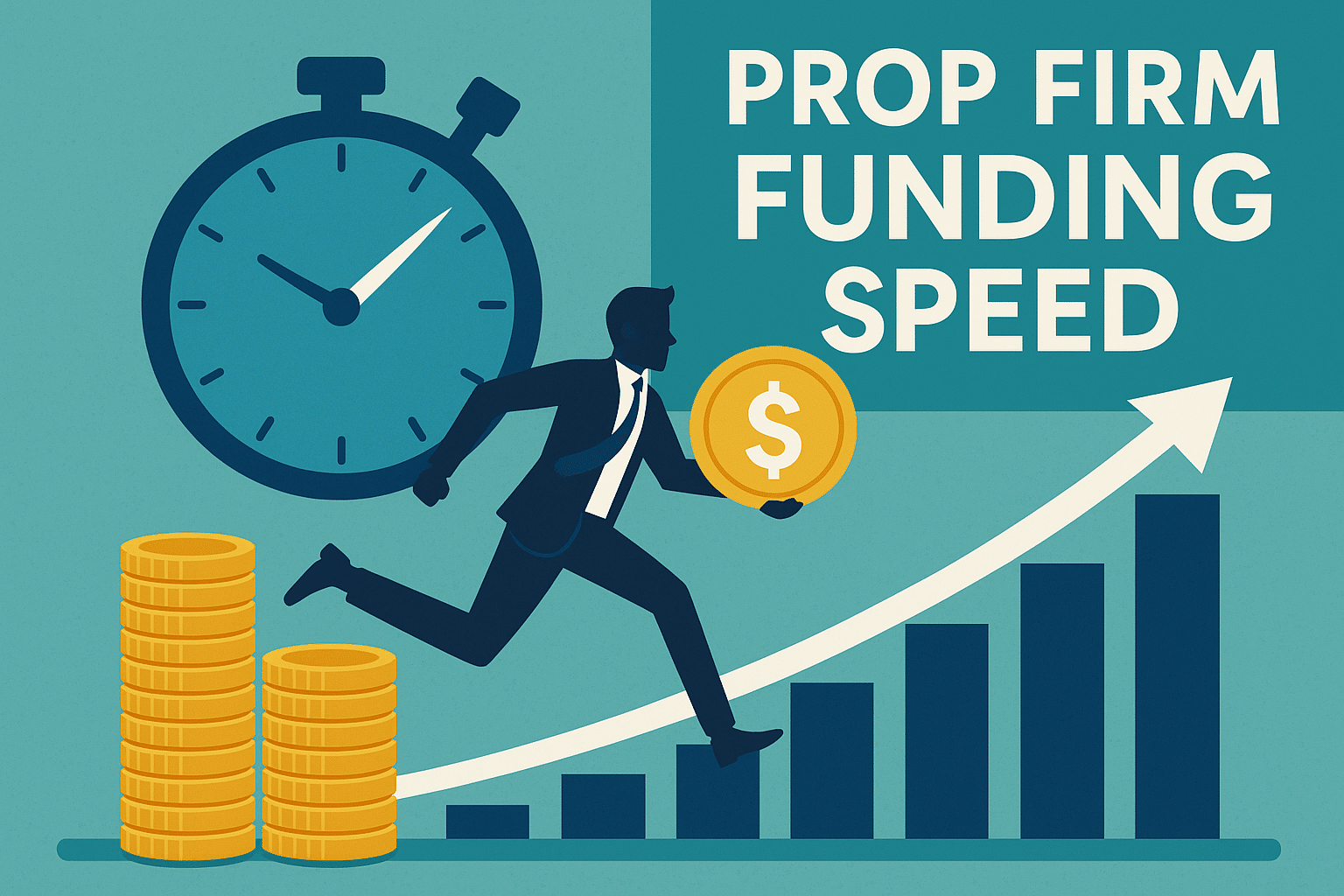How Fast Can You Get Funded by Prop Firms?
In the world of proprietary trading, one of the most common questions aspiring traders ask is: how fast can you get funded? Understanding prop firm funding speed is crucial if you’re eager to transition from demo trading to managing real capital. This article will explore what determines funding timelines, how you can accelerate the process, and what realistic expectations should look like.
Why Prop Firm Funding Speed Matters
Time is often a significant factor in a trader’s journey. Some individuals want to secure funding quickly to capitalize on market conditions, while others may be eager to replace their income or test strategies under real-world pressure.
The prop firm funding speed can impact not only your trading psychology but also your financial planning. Fast funding allows traders to build momentum, while long delays may lead to frustration or demotivation. However, speed isn’t everything—completing the process properly and sustainably is just as important as how quickly you get funded.
The Typical Funding Process: An Overview
Before diving into how fast you can get funded, it’s essential to understand the structure most firms follow. Generally, the process consists of the following stages:
-
Evaluation Phase 1: You’re required to hit a profit target while respecting drawdown and risk parameters.
-
Evaluation Phase 2 (if applicable): A verification stage that often has a smaller target and less time pressure.
-
Account Review and Approval: Once you pass, the firm reviews your performance and issues the funded account.
Depending on the firm’s policies and your trading pace, this process can take anywhere from a few days to several weeks.
Factors That Influence Prop Firm Funding Speed
1. Trading Frequency and Style
Scalpers and day traders might complete the evaluation faster than swing traders who hold positions longer. However, faster isn’t always better—aggressive trading can also increase risk and lead to disqualification.
2. Evaluation Criteria
Some firms have fixed minimum trading days, meaning even if you hit the profit target in two days, you still need to trade for 5 or 10 sessions. Always check the firm’s rules before starting.
3. Weekend and Holiday Delays
If you complete your challenge on a Friday, the account might not be reviewed until Monday. Similarly, holidays can delay the review or funding step.
4. Platform and Processing Times
Some firms offer automated account upgrades, while others do manual reviews. The latter can add a couple of business days to the process.
Fast-Track Options: Are They Worth It?
Certain firms offer express funding models that skip the evaluation or condense it into a one-step process. While this can significantly reduce the time it takes to get funded, these programs often come with higher fees or stricter conditions.
If speed is your top priority, these programs might be worth considering. But be cautious—some fast-track offerings can compromise quality or lack proper risk controls. Traders should always prioritize transparency and support over speed alone.
How Larsa Capital Handles Funding Timelines
At Larsa Capital, the evaluation and funding process is designed to balance efficiency with rigorous standards. Traders who meet all requirements can often expect account upgrades within a short timeframe, typically between 24 to 72 hours after passing. While Larsa encourages responsible and consistent trading, it also recognizes the importance of minimizing unnecessary delays.
Moreover, Larsa provides clear documentation and customer support to ensure traders understand each step of the process. This minimizes confusion and helps traders stay focused on performance rather than logistics.
Setting Realistic Expectations
Though stories circulate online about traders getting funded in just 2 or 3 days, these are exceptions—not the norm. Here are some realistic timelines to consider:
-
Fastest Possible: 3–5 trading days (for high-frequency traders under flexible rules).
-
Typical Range: 10–20 days including reviews and weekends.
-
Extended Timelines: 30+ days, especially if the trader prefers a slower, low-risk approach.
Setting reasonable expectations helps maintain emotional stability during the challenge and prevents rushed decisions that could jeopardize your account.
Tips to Speed Up Your Prop Firm Funding Without Compromising Quality
1. Know the Rules in Advance
Before starting your evaluation, study the firm’s rulebook. This prevents accidental violations that could set you back.
2. Trade During Volatile Hours
Engaging with the market during sessions with higher liquidity can help you meet your profit targets more efficiently.
3. Keep a Journal
Track your trades and decisions. If something goes wrong, you’ll be able to make adjustments quickly and stay on course.
4. Use a Clear Strategy
Don’t experiment during the evaluation. Stick to a tested strategy with known risk/reward parameters.
5. Stay Consistent
Spikes in lot sizes, profit volatility, or random trade behavior can trigger reviews—even if you pass.
A Balanced Approach to Funding Speed
While it’s tempting to rush the process, traders should remember that the goal isn’t just getting funded—it’s staying funded. Long-term success in proprietary trading requires discipline, emotional control, and adherence to risk management principles.
In other words, prop firm funding speed should never come at the expense of quality execution or sound decision-making. Fast funding is great—but sustainable performance is even better.
Final Thoughts
If you’re aiming to secure funding quickly, it’s certainly possible—especially with preparation and discipline. However, understanding the entire lifecycle of the evaluation process and managing your pace accordingly is essential.
By focusing on consistency and aligning your strategy with firm expectations, you not only accelerate your funding but also increase your chances of long-term success in the world of proprietary trading.
For traders looking for a reliable and efficient funding process, Larsa Capital continues to offer streamlined onboarding while maintaining professional standards and trader-first support.

